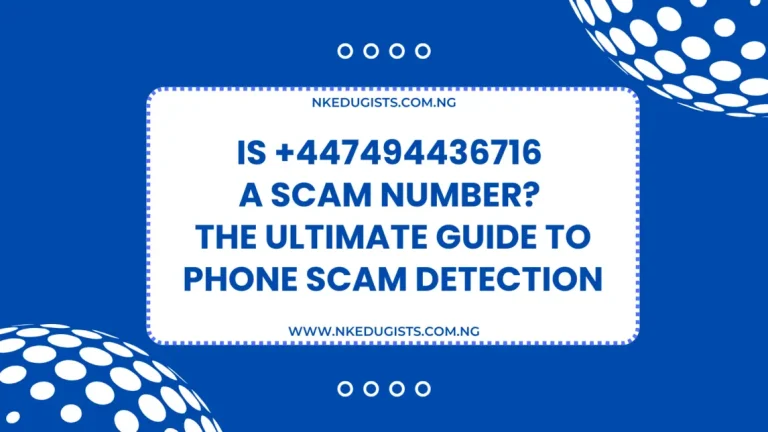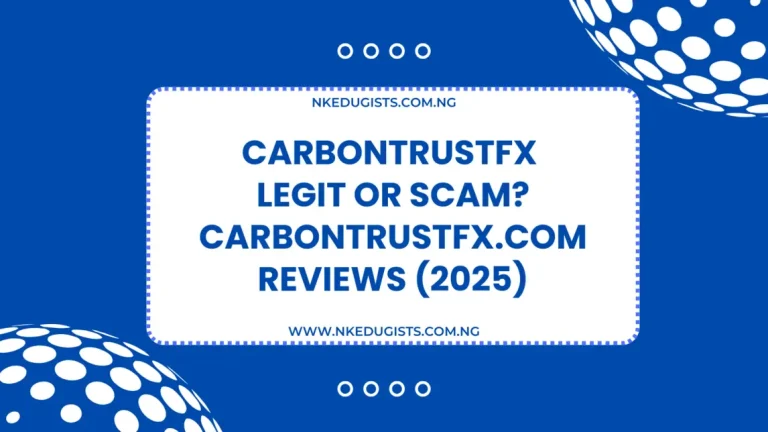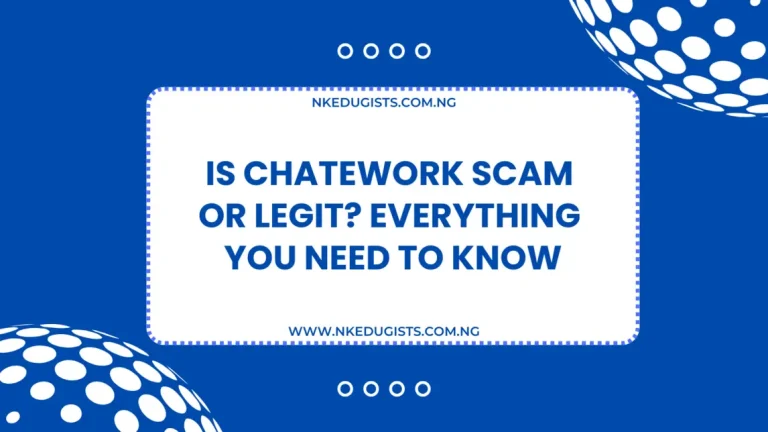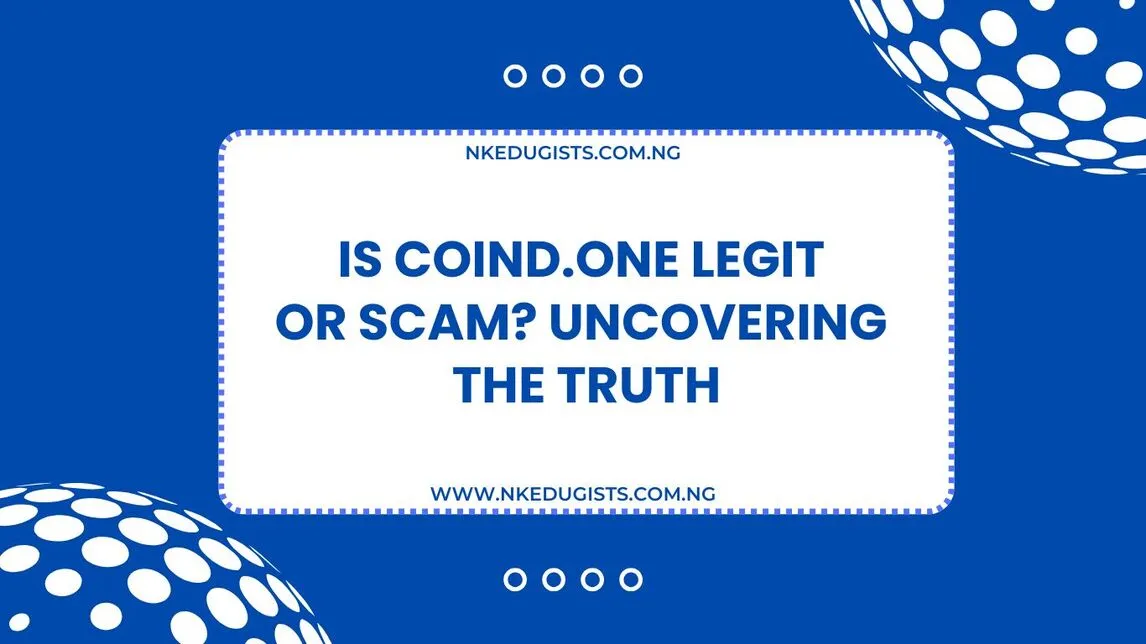
The cryptocurrency space is booming—with countless projects promising revolutionary change, fast profits, and the next big breakthrough in finance.
But with rapid growth come scams, misrepresentations, and fraudulent schemes. One question that often arises among investors and crypto enthusiasts is: “coind.one legit or scam?”
In this blog post, we’ll unpack everything you need to know about coind.one and the red flags that might help you make informed decisions in the volatile world of digital currencies.
Quick Overview of the Crypto Industry
The cryptocurrency industry is both exciting and challenging. While innovation abounds, so does the potential for scams. Every investor’s journey starts with one critical question: “is coind.one legit or scam?”
Understanding how to navigate this digital Wild West is crucial to protecting your hard-earned money.
In this guide, we will share detailed insights, from technical analysis to consumer feedback, to help you differentiate between a legitimate opportunity and a high-risk venture.
Crypto scams have evolved over the years, and today’s fraudulent schemes can look astonishingly professional. Whether you’re a seasoned investor or new to the crypto world, the stakes are high.
Inaccurate or misleading information could result in significant financial loss. That’s why a deep-dive analysis like this one is essential before you decide to invest or engage with any platform—even one with a name as intriguing as coind.one.
Background of coind.one: What Is It All About?
Before answering the burning question “coind.one legit or scam?”, we must first understand what coind.one claims to be.
According to its website, coind.one is presented as a cryptocurrency platform offering various services related to digital assets. However, several factors need scrutiny:
- Presentation and Claims: The site makes bold promises, often similar to other crypto platforms that overpromise and underdeliver.
- Business Model: Its business model, website structure, and even the language used can hint at whether it operates with transparency.
- Market Presence: Does it have a large, verified user base? Is there genuine activity, or is it just a shell with little substance?
Unfortunately, as you dig deeper, many questions emerge regarding its legitimacy. In our analysis below, we break down these points to answer: “coind.one legit or scam?”
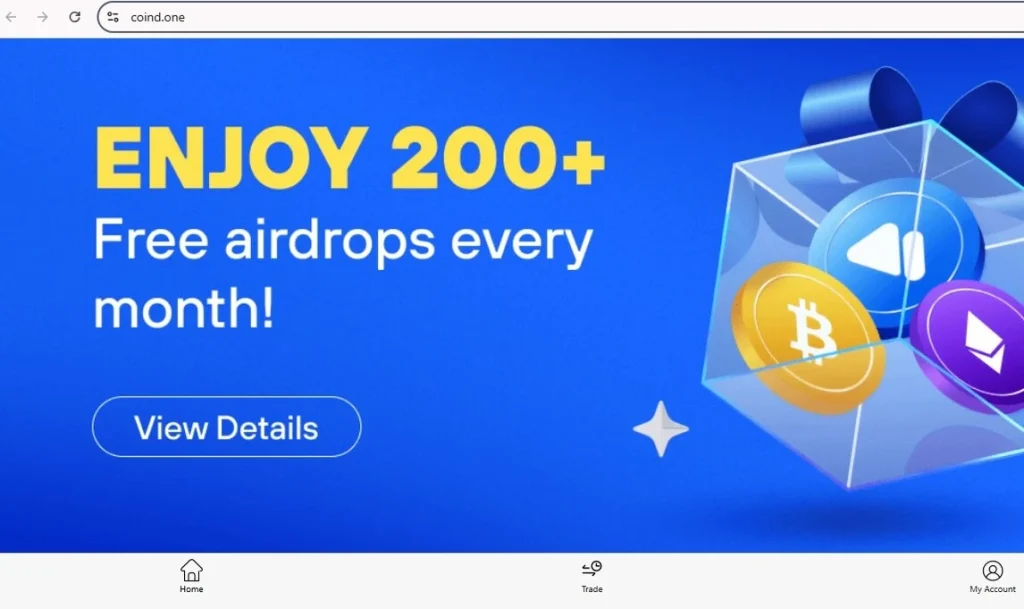
Is coind.one Legit or Scam?
When asking “coind.one legit or scam?”, there are a few fundamental aspects you should consider:
1. Transparency: Legitimate companies are usually transparent about their leadership and background. With coind.one, the website hides essential details—raising immediate red flags.
2. Regulatory Compliance: Trusted crypto platforms adhere to regulatory guidelines. A lack of clear regulatory status can be a warning sign.
3. User Reviews and Online Reputation: Independent reviews from sites like Scamadviser indicate that coind.one has a low trust score and few user reviews, making it hard to verify its authenticity.
4. Technical Indicators: Factors like domain age, website traffic, SSL certification, and DNS filtering can reveal if a site is newly minted and potentially risky.
Our analysis of these basics often leads to the repeated question: “coind.one legit or scam?” And the initial signs point to caution.
Coind.one Technical Analysis: Domain, Trust Score, and Anonymity
Let’s examine the technical details that play a crucial role in deciding if a website is trustworthy.
Domain Registration and Age
The coind.one website was registered very recently. New domains are common with scam sites, as they can disappear quickly once the scheme runs its course.
The website’s owner is hidden behind a paid privacy service. While this is sometimes standard in the crypto industry, it can be a sign of potential malfeasance.
Trust Score and Traffic
Reviews from trusted platforms such as Scamadviser rate coind.one with a low trust score. Such scores are calculated by considering server location, SSL certificate validity, domain history, and more.
Low visitor numbers suggest that the website might not be widely used, which can be typical for new or niche sites—but also could indicate that users are steering clear of it due to negative feedback.
SSL Certificate and Security
While coind.one does have a valid SSL certificate, it’s important to note that free Domain Validated Certificates (DV SSL) are common and do not necessarily guarantee legitimacy.
When you sum these factors up, the repeated question “coind.one legit or scam?” arises with cautionary undertones. Technical data implies that there’s more to be wary of than meets the eye.
Red Flags and Warning Signs Found on coind.one
If you’re still wondering, “coind.one legit or a scam?”, here are some red flags to watch for:
Owner Anonymity: Legitimate businesses typically provide verifiable details about their founders and management. Coind.one’s use of privacy services to hide ownership raises significant concerns.
Low Website Traffic and Domain Age: A newly registered domain with low traffic is common among scam websites. Legitimate platforms usually build a solid online presence over time.
Lack of Independent Reviews: Reliable platforms have a wealth of independent reviews and active communities. Coind.one currently lacks substantial user feedback, which makes it difficult to verify claims.
High-Risk Financial Services: Coind.one is linked to high-risk cryptocurrency services, which are a common target for scams. Many fraudsters latch onto the crypto boom with promises of fast returns but deliver little value.
Overpromising and Under-Delivering: If a website promises extraordinary returns or revolutionary technology without solid proof, it’s wise to be skeptical.
Comparisons with Known Scams: The characteristics observed in coind.one—privacy protection, low traffic, and dubious claims—are common in known scam projects.
Comparing coind.one with Legitimate Crypto Platforms
To better decide if “coind.one is legit or scam?”, it’s helpful to compare it with well-established crypto platforms. Here’s what you should look for:
1. Transparency and Regulatory Oversight
Legitimate Platforms openly display regulatory licenses, leadership information, and have verifiable contact details. Platforms like Coinbase, Binance, and Kraken are examples of regulated, transparent businesses.
coind.one, In contrast, the lack of verifiable leadership and the use of privacy services are concerning indicators.
2. Website Traffic and User Engagement
Trusted platforms attract significant user engagement and have active communities across social media, forums, and review sites. However, coind.one low traffic and absence of community feedback suggest that few users trust or use the platform.
3. Business Model and Service Offerings
Reputable companies offer a range of services with clear revenue models, security protocols, and compliance with financial regulations. coind.one, on the other hand, the business model appears vague, with promises that are hard to validate independently, leaving you with the recurring query: “coind.one legit or scam?”
4. Security Measures
Legitimate platforms invest in advanced security measures, clear privacy policies, and transparent terms of service. Although coind.one has a valid SSL certificate, the overall security profile is undermined by its new domain and lack of independent validation.
This comparison reinforces the need to ask, “Is coind.one legit or scam?” and to lean toward caution when the red flags outweigh the positive attributes.
What Do the Reviews and Consumer Feedback Say?
While independent reviews are invaluable for any investment decision, coind.one suffers from a scarcity of reliable feedback:
Reviews from Scamadviser
The Scamadviser review of coind.one shows a low trust score, citing factors such as the use of privacy services, a newly registered domain, and low visitor numbers. There are few to no independent user reviews or testimonials verifying its legitimacy.
Social Media and Forum Discussions
A search for “coind.one legit or scam?” across popular forums and social media reveals very few detailed discussions. In contrast, well-known scams have plenty of chatter with numerous victim reports.
The absence of community engagement may indicate that either users have not had significant experiences with the platform or that potential investors are steering clear due to inherent risks.
Analyzing the Overall Sentiment
Many indicators point toward the need for caution. When you see phrases like “owner hiding identity” and “newly registered domain,” it reinforces the question: “coind.one legit or scam?”
Financial security experts advise sticking with platforms that have been around longer and have established regulatory oversight.
The dearth of positive, verified user feedback should lead you to maintain skepticism. Always remember, if many investors were happy with a platform, you would see plenty of robust community interaction.
How to Protect Yourself in the Crypto Space
Whether you’re wondering, “coind.one legit or scam?” or exploring other investment opportunities, protecting your assets is paramount. Here are some essential tips to ensure your safety:
Do Thorough Research
- Check Reviews: Use multiple independent sources such as Scamadviser, Trustpilot, and crypto forums.
- Verify Ownership: Look for verifiable details about the company’s leadership and regulatory status.
- Examine the Website: Analyze the domain age, SSL certification, and website traffic. New and poorly maintained websites should raise red flags.
Confirm Regulatory Compliance
- Look for Licenses: Trust only platforms that are regulated by top-tier financial authorities (e.g., SEC, FCA, ASIC).
- Verify with Regulators: Use official regulatory websites or tools to check the legitimacy of the platform.
Use Secure Payment Methods
- Avoid Direct Bank Transfers: Use reputable payment systems with dispute resolution processes.
- Set Up Two-Factor Authentication (2FA): Always enable extra security measures on your accounts.
Diversify Your Investments
- Don’t Put All Eggs in One Basket: Even if a platform seems promising, diversify your investments across multiple, trusted channels.
- Invest Only What You Can Afford to Lose: The crypto market is volatile, so always be prepared for fluctuations.
Stay Informed
- Follow Trusted News Sources: Subscribe to reliable crypto and financial news outlets.
- Join Community Forums: Engage in discussions with seasoned investors to gain insights.
Following these best practices will help you avoid scenarios where you must ask repeatedly, “coind.one legit or scam?” and instead build confidence in your investment choices.
The Importance of Due Diligence in Crypto Investments
Due diligence is the cornerstone of successful investing—especially in the crypto world. Here’s why it matters:
Avoiding Emotional Decisions
Rely on hard data rather than hype. Emotional decisions can lead to high-risk investments. Break down every aspect of the platform (from its technical setup to its business model) to assess risks.
Long-Term Safety
In an industry where scams are prevalent, rigorous due diligence can help protect your investments. Build a Solid Portfolio. Prioritize platforms with a track record of transparency and regulatory compliance.
Learning from Past Scams
Many high-profile scams, such as OneCoin and other MLM-based crypto frauds, teach us that due diligence is non-negotiable. When a platform repeatedly prompts you to ask “coind.one legit or scam?”, it’s a signal that further investigation is required.
Tools and Resources for Due Diligence
Use official databases to check for licenses and compliance. Websites like Scamadviser aggregate various data points to give you a clearer picture of a platform’s legitimacy. You can also engage in communities such as Reddit, BitcoinTalk, and other crypto forums to hear real user experiences.
Steps to Take If You’ve Been Scammed
In the unfortunate event that you suspect you have been scammed by a platform like coind.one, knowing the steps to recover your funds and report the scam is crucial. Here’s what you can do:
1. Document Everything
Keep emails, chat logs, and screenshots of your interactions with the platform. Document every transaction detail, including dates, amounts, and payment methods.
2. Contact Your Payment Provider
If you used a credit card or an online payment system, contact your bank to see if a chargeback is possible. Then, alert your financial institution about the fraudulent activity.
3. File a Complaint
If the platform claims to be a financial service, report the incident to your local securities regulator or financial authority. tilize resources like the Federal Trade Commission (FTC) in the United States or similar agencies in your country. In some cases, filing a police report can be a critical step, especially if large sums of money are involved.
4. Seek Professional Help
Consult with a lawyer who specializes in financial fraud. Be very cautious—many recovery services are scams in themselves. Do thorough research before engaging with any firm claiming to help you recover your funds.
5. Warn Others
Share your experience on trusted forums and review sites. The more information that is available, the better others can protect themselves. Using social media platforms like Twitter and LinkedIn can amplify your warning to a broader audience.
Verdict: Is coind.one Legit or a Scam?
After dissecting every aspect—from technical data and user feedback to business model transparency—the answer to “coind.one legit or scam?” is leaning toward caution.
Here’s a summary of our findings:
- The website is recently registered, and its ownership details are hidden, a common trait in scam platforms.
- Independent review sites like Scamadviser rate coind.one with a low trust score, citing several red flags.
- There is a noticeable absence of positive, verified user reviews and active community engagement.
- The platform’s vague offerings and lack of clear regulatory adherence further contribute to the uncertainty.
While we must always allow for the possibility that further data might emerge, the current evidence strongly suggests that coind.one exhibits many of the classic warning signs of a scam.
Therefore, if you’re asking “coind.one legit or scam?” our expert advice is to proceed with extreme caution—or better yet, avoid investing altogether until more reliable information is available.
Conclusion
In today’s fast-paced and ever-evolving crypto space, it is more important than ever to safeguard your investments by doing thorough research.
Our comprehensive review aimed to answer the recurring question: “coind.one legit or scam?” We broke down technical details, compared the platform with well-established crypto exchanges, and provided actionable advice on protecting yourself against potential scams.
Ultimately, if you find yourself repeatedly questioning “coind.one legit or scam?”, that uncertainty alone should prompt you to consider alternative, more transparent investment opportunities.
The crypto world is full of potential, but only by being vigilant and well-informed can you avoid falling victim to scams.
Thank you for reading this detailed guide. We hope it has provided you with the clarity and tools you need to navigate the crypto space safely. Always remember that while the promise of high returns is enticing, protecting your hard-earned money must always come first.
If you found this article helpful, please share it with others who might be facing similar concerns. Stay safe and keep questioning until you get to the truth behind every crypto platform.
